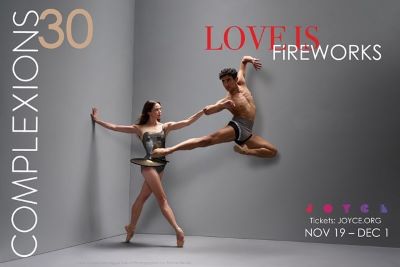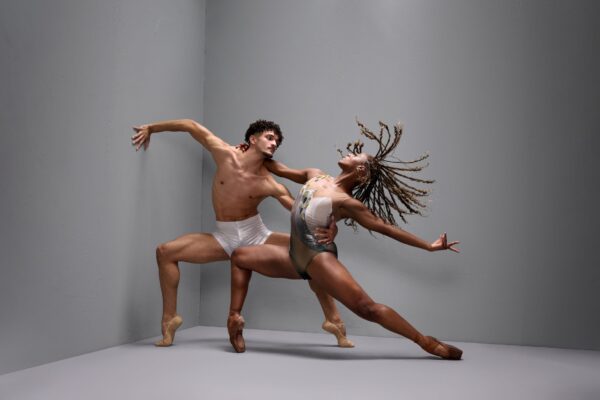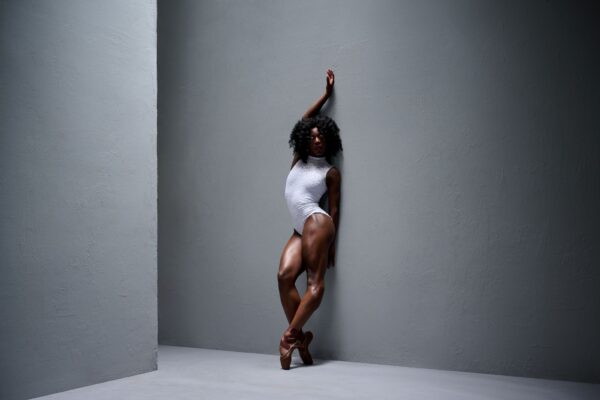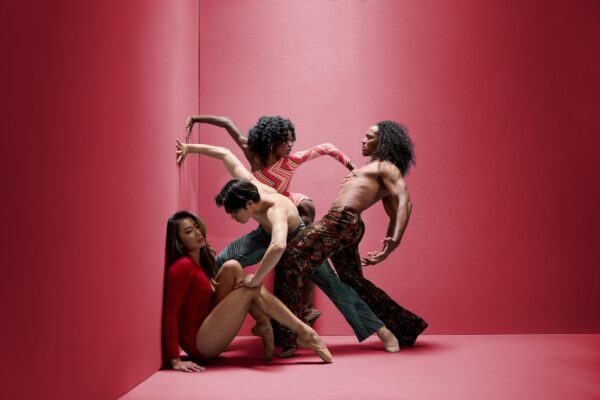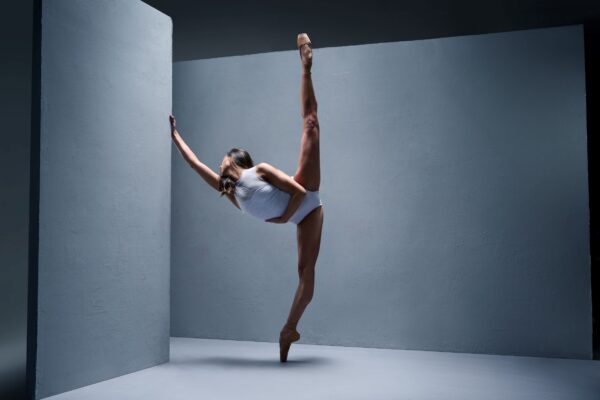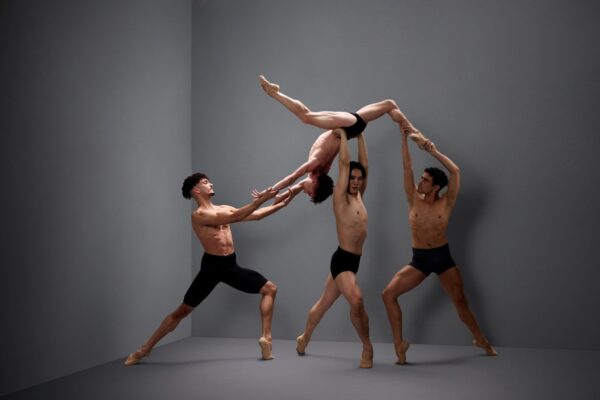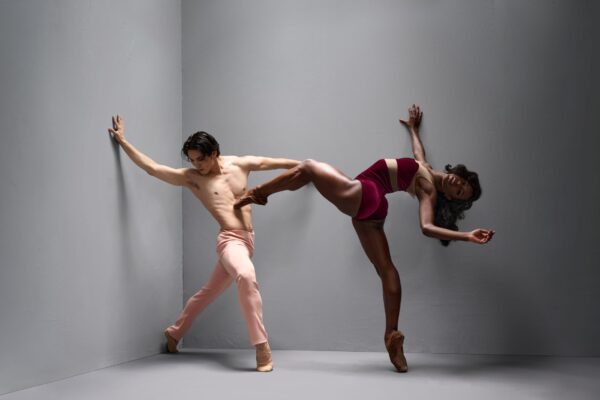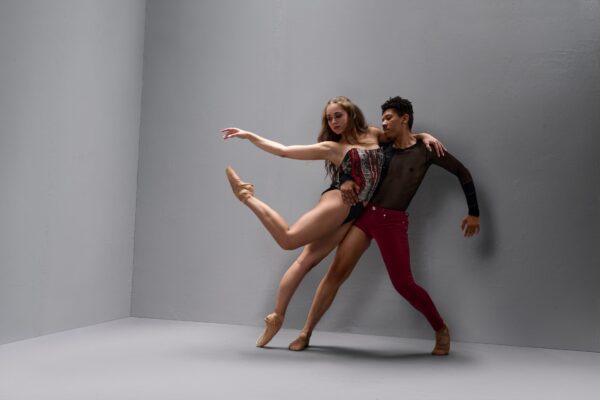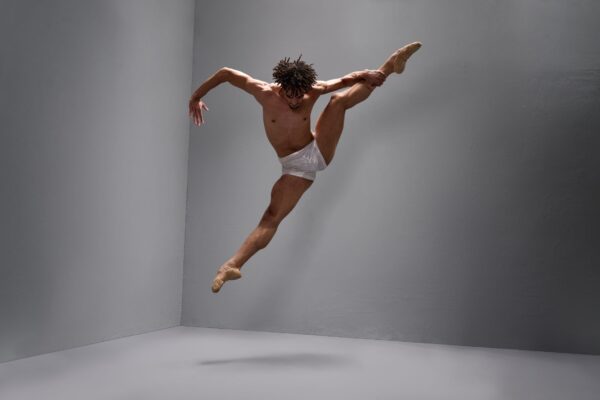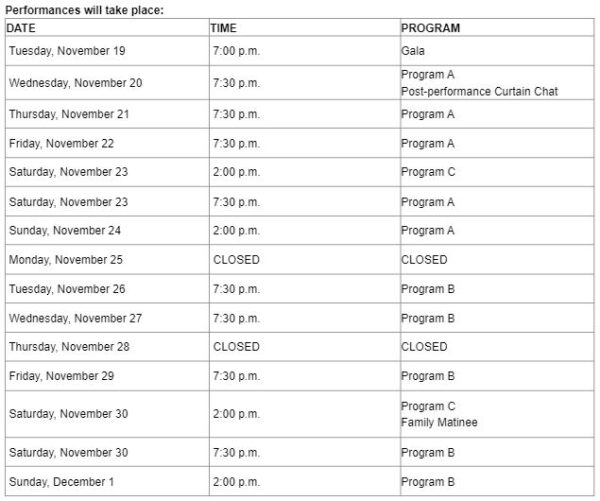As the curtain rises on Complexions Contemporary Ballet, I am greeted by five gorgeously toned, leggy dancers with sinewy rippling musculature arranged in a staggered line. Their bodies, racehorse-like vessels glowing under harsh spotlights, denoting a company of acute physical bravado. Last night began a two-week celebration of its 30th Anniversary Season — a repertoire featuring premieres and audience favorites — running thru December 1, 2024, at The Joyce (see calendar below for Programs B & C dates). Through Sunday Nov. 24 is Program A, which consists of four works: This Time With Feeling, Cry Me, Deeply, and Retro Suite — all of which feature similarly dimensionless and at times breathtaking depictions of “drama”.
This Time With Feeling, choreographed by Dwight Rhoden (the company’s co-artistic director alongside Desmond Richardson), highlights the dancers through varied group sections, pas de deux, and pas de trois. This New York premiere features sparse violin and piano accompaniment by David Rosenblatt, framing the work with polished sonic elegance while evoking a timeless energy á la Forsythe. The women wear deep purple halter leotards, their bare legs expressive and feet articulate in flesh-colored pointe shoes. Their respective male counterparts jump asynchronously in tight purple shorts creating a rushed, chaotic ethos to the piece — one void of containment or energetic unity as the movers opt to utilize group sections as though they were solos.
Chloe Duryea emanates with exacting demand over her body as she toys with the musical dynamics; her stage presence earnest and playful while Jasmine Cruz’s steadfast technique shines through as she échappés and pirouettes with unwavering conviction. The piece utilizes the company’s mesmerizing angularity as they shift from one acrobatic arabesque to torqued tendus paired with spiraling backs, their lines extending far beyond the confinement of the stage. This informed understanding of balletic line is combined with a more recent notion of drama that veers away from heartbreak and may be otherwise categorized as simply “fierce”.
As the work progresses, this principle of ferocity does not give way to any alternate shade of sentiment; the emotional undercurrent plateauing and unearthing a stubborn choreographic and psychic threshold. Although the movement is pleasing to witness at first, the risk factor is nowhere to be found as steps are recycled not as motifs but as crutches masquerading as structure. Alternate spatial planes are left unexplored as the dancers primarily assume the same academic formations and upright stance en pointe, rarely exhibiting the freedom required to invoke artistry beyond mere technical fulfillment. This leads to rather predictable choreographic repetition and the idea of Rhoden in the studio waving a hand saying, “When in doubt, do a tilt!” flickered in my mind’s eye.
A company premiere, Cry Me choreographed by Jae Man Joo, begins with Jillian Davis and Joe González partnering one another under another a harsh spotlight. Davis is a lithe skyscraper, swaying with strength as she maneuvers around González’s compact reliable physicality. The unlikely duo envelop one another cultivating snippets of still entanglement that make visible their otherwise undefined bond. Philip Glass’s Etude #20 compliments their vague relation to one another, particularly when the pair lay side by side quivering on their stomachs, eliciting a soft endeared chuckle from the audience. Christian Burse appears alone, centerstage, her percussive feet bounding the floor as she executes soaring straddle leaps and hinges in half in what feels like slow-motion. Her body ping-ponged between its molten and structured states. Chloe Duryea returns to play with Bilgude Ariunbold imbuing their pas de deux with vibrant seduction, invoking Jiří Kylián’s Petite Mort. Their feline affection culminates with an infinite spin into darkness with Bilgude as the center axis to Duryea’s lengthy limbs. For a moment, they appear as if they might spin up and away like a winged gyroscope flung into a deep alternate dimension.
The first act concludes with the world premiere of Deeply, choreographed by Rhoden. This piece contrasted starkly to what came before as Vincenzo Di Primo completes a lengthy solo to Italian singer-songwriter Lucio Dalla‘s classic song “Caruso“. Dalla’s operatics paired with Di Primo’s glittery jazz pants create a semblance of “drama” once again, without any meaningful or substantive backing. Di Primo leaps and turns with breathtaking force and technical prowess, extending his body to its limitations. However, his occupation of stage, like Rhoden’s earlier work, creates a sense of displacement. Although the piece is an excerpt, implying we have been dropped in media res, there appears to be too little reason for his concerned expression amidst the empty stage. Primo’s grace, although merited and clearly honed, falls flat due to the empty emotion reminding me that drama can only exist if there is a cause. His solo is followed by Marissa Mattingly and Joe Gonzalez who complete a similarly lackluster pas de deux. Her latex leotard serving as an awkward stand-in for what I can only assume was meant to be a sensuous partnership, that instead devolved into a disconnected struggle towards choreographic completion, the concept of tension hardly bubbling to the surface.
The second act features Retro Suite, a collection of Rhoden’s classics that span the 30-year history of the company. Beginning with a boogie bang is Rise/Higher Ground, featuring disco ball-like dancers amidst a joyous celebration, their smiles bright and infectious as they strut across the stage in ballroom shoes to songs by U2 and Earth, Wind and Fire. Christian Burse dazzles in Growth, set to Steve Reich’s The Four Sections IV completing an athletic six-minute solo chock full of leaps and a breathtaking triple pirouette that unfurls into a, you guessed it, tilt!
Naked Perfume is an exhaustive pas de deux hinging upon a golden frame prop. Much of the dancing appears as if it were straight out of a discount dance catalog, stiff and awkward without much substance behind it besides the frame itself — an unfortunate disservice to its cast. Bach 25 was incredibly dynamic as the company surged the stage with light-footed glee, fluttering like a swarm of butterflies; the classical score elevating their movement to another realm of classicism — a great piece for the company at large. The three remaining pieces Gone (a pas de trois featuring male dancers), Ave Maria (a pas de deux), and Mercy (featuring the whole company) demonstrated more of the same signature movement vocabulary with solid technique and little vulnerability to back it.
I’ve come to the understanding that Rhoden’s work and company shine brightest in his pieces that are void of flash. His ability to meld contemporary dance and ballet form is best exhibited when classical frameworks are adhered to rather than rebelled against in the name of individuation. The pieces that manage to do so, to sink their teeth into movement as an expression of the music rather than adhering to a predetermined theme, were the works I didn’t wish to end. The dancers of Complexions are talented, dynamic, and clearly eager to please in Program A, and it’s certainly infectious.
promotion photos courtesy of Complexions
Complexions Contemporary Ballet
30th Anniversary, Program A
The Joyce Theater, 175 Eighth Avenue
for tickets, visit Joyce
